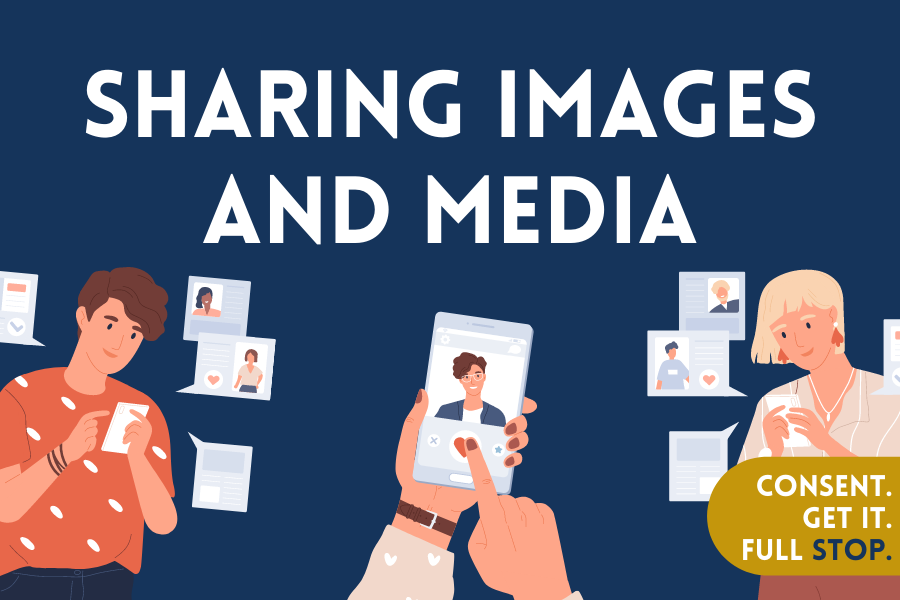As part of Safer Internet Day 2022, Kent academics share their expertise and tips on consensual sharing of digital media
These days we all have devices with cameras at our fingertips to share photos and videos in various platforms with a few clicks – but do we think about what might happen to those images or media once we’ve hit the send button?
A nationwide survey found that 51% of young people think their friends should ask for permission before tagging them or sharing a photo or video of them, and yet over half of people surveyed said someone they knew had shared a photo or video of them without asking over the last year.
Sharing pictures of others
Images can be obtained without consent, for example, a photo taken on a night out when you weren’t aware someone was pointing a camera at you – or you might be aware of a photo being taken but not have given consent for it being shared publicly. Consent is required both when an image or video is taken, and again when someone intends to share it.
Unless the image is of yourself, you cannot be sure whether an image/video was obtained or shared with consent, so think about how the person in the image/ video might feel about you sharing it further – it may just look like a funny photo or video to you, but if you were the protagonist, how would you feel about it being publicised without your knowledge and agreement?
Sharing explicit images
This is even more important in the case of private, sensitive or explicit images or videos. One should never share such images, unless they have the explicit and informed consent from the person(s) appearing in those images/videos. Even if the media was obtained with consent, for example, sent with agreement between two people in a sexual relationship, images must never be shared further without the consent of the person/ people appearing in them.
What is revenge porn?
It may seem natural to let someone you trust, and have a relationship with, take photos or record videos of intimate moments. This becomes part of your history together, right? The problem is that you cannot predict how such content may be used in the future, and once you’ve shared that content you could lose control of how it’s subsequently shared, for example after a breakup or a disagreement.
Image-based sexual abuse (also known as revenge porn) is a crime with far reaching consequences for its victims. It entails the sharing (or threatening to share), taking, and making of sexually explicit images or videos of another person without their consent. This can include digitally altered material (for example, through photoshop) and material known as “deepfakes” which are synthetic media where a person’s image is superimposed or stitched onto someone else’s image or video.
What should I do if someone shares photos of me without my consent?
- Do not argue with the person who did this.
- Get help: if you are under 18, let your parents or school authorities know. If you are over 18, get expert help such as from The Revenge Porn Helpline UK, The Cyber Helpline or Victim Support, they can offer you advice, support and help with content removal and evidence gathering.
- Seek support from friends and family: what has happened to you is not your fault, you are a victim of an internet crime and you deserve support and comfort.
- Contact the police by dialling 101, if you are in an emergency and immediate danger dial 999.
- Record details of how you found out that your intimate media has been shared and gather as much evidence of that as possible. This can help if the police need to get involved.
- If you find one of your images on a social media platform, you can use the platforms’ own reporting mechanisms.
When it comes to the sharing of intimate images, it is not the sharing and getting nudes/ explicit images (when there’s consent) that is the problem. It is the further sharing of the media with other people without consent that is a crime. If you want to know more about how you can protect your information and privacy in the digital age and take back control of what is shared about you online, check out our other article for Safer Internet Day, Consent in the Digital Age: Protecting Your Information [to link here].
Thanks to Dr Afroditi Pina from the School of Psychology and to the following academics from the Institute of Cyber Security for Society (iCSS) at the University of Kent, for providing this information.
With contributions from: Sarah Turner, PhD Researcher in Cyber Security, School of Computing; Dr Virginia Franqueira, Lecturer in Cyber Security, School of Computing; Dr Paraskevi Triantafyllopoulou, Lecturer in Intellectual & Developmental Disabilities, Tizard centre; Dr Gareth Mott, Lecturer in Security and Intelligence, School of Politics and International Relations; Dr Mu Yang, Senior Lecturer in Digital Marketing Analytics, Kent Business School; Professor Shujun Li, Professor of Cyber Security, School of Computing; Dr Jason Nurse, Senior Lecturer in Cyber Security, School of Computing
Written by Filipa Paes, third year student, 28.01.22
Check out further articles on Consent.

